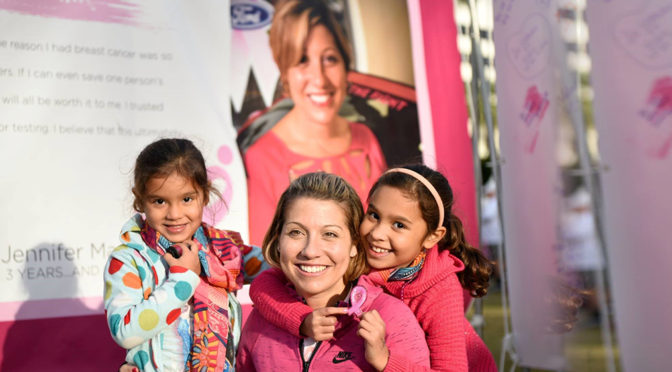3 YEARS Cancer-Free: Three Ways Your Life Changes
For breast cancer survivor Jennifer Martinez, the more life changes, the more it remains the same.
Three years ago, Martinez finished her chemotherapy treatments, which followed surgery, to rid her body of breast cancer. What has remained the same since her recovery is that she still leads a successful Wellington public relations firm; she is still wife to Gil Martinez, who works with State Farm; and she is still mother to their two daughters.
She still exercises, travels with her family, laughs with her mother, Bobbi, and remembers her father, Mitch, who died of cancer due to a late diagnosis. Life is still good.
But how life has changed since being told she was “cancer free” is another matter — one that many cancer survivors live with every day. Consider it a “new normal.” Not better, not worse — just new — in three meaningful ways.
Becoming Part of Hope.
“When I was diagnosed with breast cancer at age 32, I decided to have surgery immediately, which was over the holidays, so no one would be suspicious if I was not around as much. I didn’t want to worry my clients or my friends about my health or my ability to accomplish my work,” Martinez recalled. “Plus, I didn’t want anyone’s pity. But once I had entered chemotherapy, I had an opportunity to work with breast cancer awareness organizations that were raising money to educate and support others. It was time to share my story, and in doing so, I became a somewhat reluctant symbol for hope. I’ve gotten more comfortable with that role, as I see how important it is to share my experience, particularly with other young patients and survivors.”
Martinez’s firm, JLM Communications, now works with Susan G. Komen South Florida, promoting its annual Race for the Cure and programs to support women and men affected by breast cancer. A Warrior in Pink, she understands the mission, the impact and the significance of the nonprofit organization.
“Komen has touched just about every advance in the fight against all cancers,” Martinez said. “When I had the chance to play a role in this, I had to do it. To know that what we are doing is saving lives is not something I take lightly.”
Maintaining Constant Vigilance.
Being “cancer free” doesn’t mean being without worry. For Martinez, every ache, pain or errant symptom takes her right back to her cancer diagnosis and the possibility of its return. For her, there is no such thing as a minor ailment. “You’re constantly aware of your health, and you learn to manage the fear that the cancer could and might come back,” she said.
Recognizing Her Family Has Changed, Too.
For her husband Gil, mother Bobbi and her daughters, life after cancer is different, as well. A close family, they do not miss opportunities to travel. Vacations are required, and relaxation is essential.
“We don’t dwell on the fact that Jen had cancer or that we lost her dad to cancer,” Gil said. “But we don’t take for granted that she’s healthy and she’s with us. Cancer made us grow up fast and, fortunately, it brought us even closer. Nothing has changed, and honestly, that’s what makes it all so special. We are normal, even after cancer.”
October is National Breast Cancer Awareness Month, and is the perfect time to schedule your mammogram and remind your loved ones to do the same. Early detection is the key to survival.
To support breast health education, treatment and research during October, or to participate in the upcoming Race for the Cure, set for Jan. 27, 2018, visit Komen South Florida at www.komensouthflorida.org.
